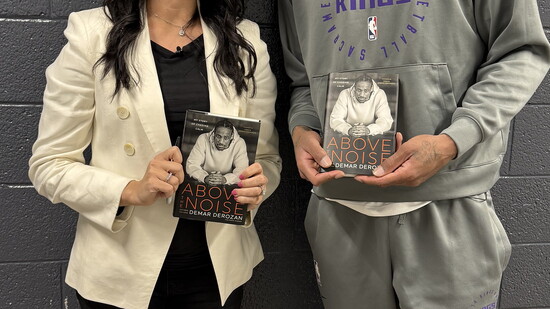In today’s performance-driven world, strength is often measured in silence. But high-performing men—from the NBA hardwood to the Olympic track—are rewriting that script.
Mental health isn’t a weakness to hide, it’s a skill to master. And from the many athletes and high-achievers I’ve interviewed, one message rings clear: you can’t reach your peak if your mind isn’t in shape.
Here’s how four elite performers are reshaping what mental fitness means and what every man can take from their playbook.
DeAndre Jordan: “You can be in peak shape, but if your mind isn’t there…”
NBA veteran DeAndre Jordan learned early that the physical grind is only half the equation. “I had to learn how to be mentally fit,” he told me. “You can be in peak shape, but if your mind isn’t there, it shows up in your performance.”
When Jordan moved into the postseason, he doesn’t just train—he protects his focus. “Eliminating a lot of outside noise daily is vital… I tend to eliminate social media during this time along with watching sports news and coverage on the playoffs.” On game day? “Relaxation and visualization. I meditate and relax with my family and stay as present as possible.”
Mental fitness, he emphasizes, is a discipline—not a default.
DeMar DeRozan: Finding Balance On and Off the Court
For NBA All-Star DeMar DeRozan, basketball has always been more than just a game—it’s a sanctuary and a coping mechanism. That same mindset fuels him today.
Through the highs and lows of a demanding season, DeRozan stays grounded by accepting the emotional spectrum that comes with it. “You're going to have great moments and down moments, but how you approach those moments—both the good and the bad—keeps you consistent in understanding the main thing.”
DeRozan credits his mental resilience to the people who stood by him early in his career.
“A lot of my help came from close people within this league, especially coaches,” he said.
Late-night conversations in empty gyms became moments of reflection and mentorship. His wellness routine also includes daily physical recovery practices—“sauna, cold plunge... every single night.”
For DeRozan, physical recovery isn't just about performance—“you feel better mentally by taking care of your body physically.” It’s a reminder that elite athletes aren’t immune to struggle—but they build systems that support both mind and body.
Manteo Mitchell: “Faith, Focus, Finish”
Olympian Manteo Mitchell didn’t just finish his 4x400m relay at the 2012 Games—he did it with a broken leg. “Honestly, there was more going on mentally than physically,” he said. “I had to channel every emotion and setback… Faith, focus, finish—it’s my personal life statement.”
But Mitchell’s most powerful insight isn’t about grit—it’s about identity.
“Men aspire to be this or that, but they often fail to realize who they are within themselves. Find your strengths and weaknesses and build from that.”
Structure, he insists, is non-negotiable. “Being disciplined is key if you want to be successful… I’m a firm believer in visualization and writing things out to portray the image you’ve created.”
John Peel: “Mindset Is Everything”
Former collegiate athlete and iFit trainer John Peel sees mental health not as a luxury, but a daily priority.
“If we aren't confident in where we are mentally, we give ourselves more opportunity to fail physically,” he told me. John now encourages clients to open up before they work out—matching emotional honesty with physical effort.
“Sometimes a reset is exactly what we need.”
For Peel, even burnout has value—if we lean into it, recognize it early, and allow space to recover, we come back stronger.
chouletperformance.com
IG @brookchouletmd
5 Habits for Mental Strength
Do the Inner Work Start your day with intention
Know Your Why Root goals in meaning, not just success
Build Systems, Not Moods Rely on routine, not motivation
Talk It Out A mentor or therapist can shift everything
Give Back Service fuels purpose and connection
